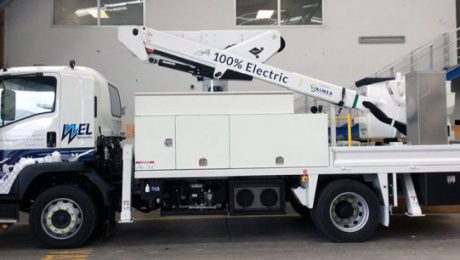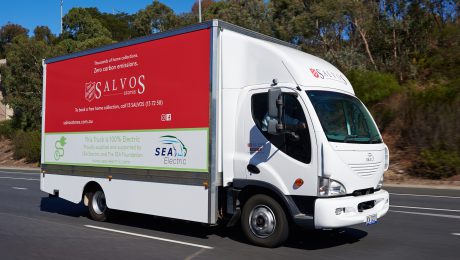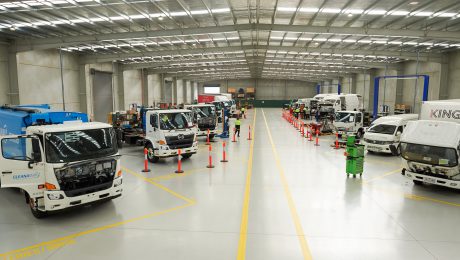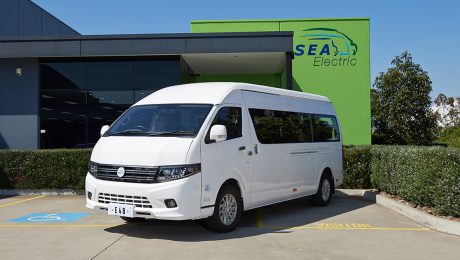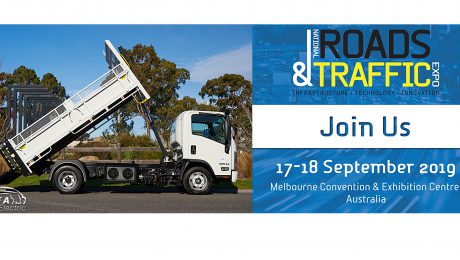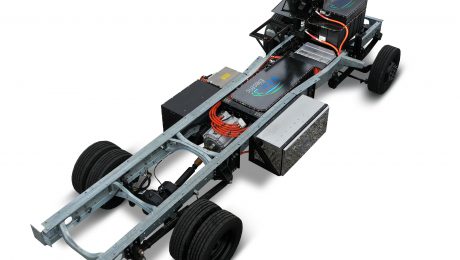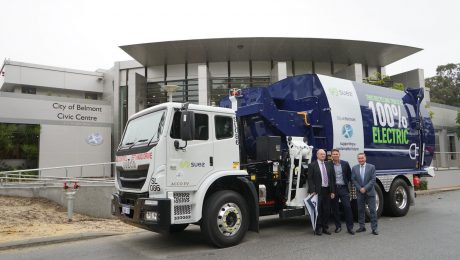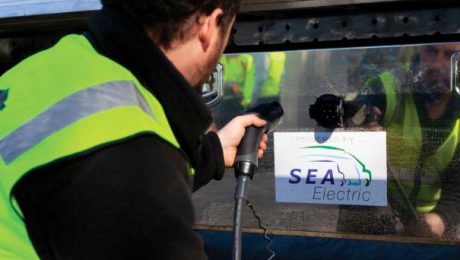NZ’S first EWP electric truck added to WEL Networks’ fleet
New Zealand’s first EWP electric truck has hit the road as part of local lines company, WEL Networks’ fleet.
Converted from a diesel truck to a 132kWh battery truck, the vehicle will be used for line maintenance and is powerful enough to operate an elevated work platform and travel 200km on a single charge.
Chief Executive Garth Dibley says sustainable energy and sustainable transport are front of mind for the business.
“We believe electric vehicles will play a really important part in New Zealand’s energy future and by investing in electric trucks, we’re not only generating fewer emissions, but also helping to future-proof our business and community.
“Throughout our operations, WEL strives to be an environmentally responsible organisation. This year we are launching structured sustainability initiatives to measure and respond to our environmental responsibilities and having more energy-efficient vehicles is a step in the right direction.”
The truck was made possible thanks to co-funding received from the Energy Efficiency and Conservation Authority’s (EECA) Low Emission Vehicles Contestable Fund.
EECA’s Manager Programme Partnerships, Richard Briggs, says “the aim of the Fund is to drive innovation, and grow confidence in an electrified vehicle fleet. Projects like this will show other heavy vehicle operators what’s possible and encourage them to invest in decarbonising their fleets.”
The truck underwent its transformation at SEA Electric in Melbourne, where the diesel engine was removed from the 10-tonne Isuzu FTR750 and a fully electric SEA-Drive system installed. SEA Electric worked in conjunction with CAL Isuzu (Hamilton) to supply the converted cab and chassis.
Waimea Truck and Crane in Nelson fitted the Elevated Work Platform (EWP). It takes between four to eight hours to fully charge the truck.
The truck complements WEL’s current electric fleet cars and network of more than 20 electric vehicle chargers in the Waikato. READ MORE
- Published in Articles, Media Release, News, SEA-Drive, Technology, Uncategorized
Salvos, Australia Post trial electric trucks
Greener fleet: SEA Electric’s truck donated to the Salvos might be an early prototype, but it is expected to easily manage the charity’s suburban delivery runs and save two tonnes in CO2 emissions each year.
SEA Electric donates EV truck to Salvos Stores as Australia Post trials Fuso eCanter
THE Salvation Army and Australia Post have added a full-electric truck to their respective vehicle fleets to assess the viability of switching to a zero-emissions powertrain for urban delivery services.
For the Salvos, Australian EV powertrain specialist SEA Electric has donated one of its early prototype trucks – based on a Smith Electric Vehicles ‘Newton’ model with an Avia chassis – that makes Salvos Stores the first charity retailer in Australia to have an electric vehicle on its distribution fleet.
Australia Post, meanwhile, has become the first Australian company to trial Fuso’s eCanter, which uses a powertrain developed by parent company Daimler and is billed as the world’s first electric truck from a major automotive OEM.
Speaking to GoAuto at the handover ceremony of the SEA-badged medium-duty truck at its Noble Park distribution centre in Melbourne’s outer southeast last week, Salvos Stores acting managing director Eva Zelos and general manager of operations Neil Lund said the electric truck would be a significant testbed as the organisation looked to develop a purchasing policy for its delivery vehicle fleet.
The national fleet stands at 84 vehicles working out of 14 distribution centres and servicing 331 stores across Australia. The vehicles make runs between household collection points and the distribution centres and stores, as well as deliveries to customers via its burgeoning Op Shop Online run through eBay.
Mr Lund acknowledged that the SEA vehicle, which is worth an estimated $50,000, was an early prototype which means its driving range is limited to about 150km between charging, but said it would be used within its limitations and posed no issues of range anxiety given its workload typically involved only short distances, stop-start driving (allowing for battery regeneration) and back-to-base runs.
Recharging to a “useable level” should take about six hours from the distribution centre’s three-phase power supply, and Mr Lund said there was scope for the vehicle to be upgraded with one of SEA Electric’s constantly evolving drivetrains that offer more power and a circa-300km range.
Currently, the electric motor produces 120kW.
“When we say it’s a testbed vehicle, we know that there are limitations to the range, and we know that we would look forward to greater range with (future) new vehicles,” he said.
Ms Zelos added that, as it stands, the truck should help the organisation reduce its CO2 emissions by about two tonnes each year. She also said that in Victoria alone, Salvos Stores made more than 40,000 deliveries a year.
Over at Australia Post, the Fuso eCanter joins a fleet of more than 2200 EVs on the road with the national postal service – primarily electric postie bikes and trikes making ‘last-mile’ deliveries – and will operate in Sydney’s CBD “over the coming weeks” before being returned to the manufacturer “for internal evaluation”.
As GoAuto has reported, Australia Post has also previously run trials with electric vans in Australia, including Renault’s Kangoo EV.
Australia Post’s general manager of transport and aviation, James Dixon, said the eCanter trial would “gauge the vehicle’s suitability for the business during customer pickups and deliveries” as part of its commitment to making its operations more efficient and sustainable, including through the use of electric vehicles.
Daimler has built about 150 Fuso eCanters and conducted trials in various cities including London, Tokyo, New York, Berlin, Amsterdam, Paris and Lisbon.
The 7.5t truck is powered by a 115kW/390Nm AC synchronous electric motor and uses six Mercedes-sourced 360V 82.8kWh lithium-ion battery packs that offer a driving range of about 100km.
It can be charged to 80 per cent capacity in less one hour with a Type 2 charger, and needs eight hours for a full recharge using a standard domestic socket. READ MORE
Article by TERRY MARTIN, GoAuto News, 23 Sep 2019
- Published in Articles, Media Release, News, SEA-Drive, Technology, Uncategorized
News – Industry News Aussie EV powertrain firm on fast charge forward
SEA Electric sees substantial ongoing growth with local, overseas contracts in works
FLEDGLING Australian electric powertrain specialist SEA Electric has doubled its production volume over the past 12 months and expects significant growth in the years ahead as it continues to expand its footprint on the back of new local and international contracts.
Less than three years since starting commercial operations, the Melbourne-based company now has close to 100 vehicles on the road with one of its SEA-Drive powertrains, and more than 60 employees in Australia and abroad who are developing the technology and forging partnerships with major manufacturers – including Ford Motor Company – as well as automotive suppliers, transport companies and other large organisations.
Financial details and the level of government support remain undisclosed, but GoAuto has learned that year-on-year compound revenue growth to the end of year three will be more than 230 per cent.
Focusing on commercial vans and light and medium trucks, SEA Electric has programs underway in Australia, New Zealand, Thailand, South Africa and, perhaps most notably, North America, where it recently sealed a deal with Detroit Chassis in Michigan to integrate the Aussie electric powertrain into Ford’s F-59 stripped chassis and produce a Morgan Olson-sourced walk-in step van for a still-secret “leading package delivery company”.
In an interview with GoAuto last week, SEA Electric’s regional director for Oceania, Glen Walker, said the company was fast approaching the “tipping point” where production would ramp up significantly at its Victorian base in Dandenong South – and at a forthcoming facility in Morwell on the Latrobe Valley coal belt – as well as in overseas markets, where it will licence the technology to the OEM or else supply the powertrain and install it where required.
It is also now set up to work with OEMs on engineering to prototype stage before ultimately licencing the full drivetrain for series production.
Mr Walker said the F-59 chassis that is found in a wide variety of vehicles, from motorhomes and school buses to US Postal Service vehicles and all manner of delivery vans, offered huge potential and that SEA Electric is working closely with development partners Roush, Fontaine and Detroit Chassis “for five Ford models currently identified, in collaboration with Ford Motor Company”.
SEA Electric’s regional director for North America, David Brosky, is also on record as saying the Ford F-59 electric chassis is expected to lead to “substantial follow-on orders from fleet customers within the next six to 12 months”.
“Currently it’s a pilot program, but discussions are ongoing,” Mr Walker said. “It (the chassis) is the foundation for many, many tens of thousands of vehicles in North America, whether they’re the UPS vans or school buses, so it’s a very versatile platform.
“We’ve currently produced one vehicle, and that’s had significant dynamometer testing and scientific testing, and it’s just about to hit the road.”
Mr Walker would not be drawn on specifying the large number of OEMs and other companies with which it is engaged in both R&D and contract negotiations, although it does have local conversion pilot programs in place with Isuzu and Hino, and is also known to be working with Ford, Isuzu and General Motors in the US.
“As much as I would love to share with you who they are, and what they are, (I can’t) – suffice to say we’re very excited about it and they are significant entities in the global automotive supply space,” he said.
“We’re approaching that tipping point where we don’t have to combat market acceptance, and on the other side of that tipping point is significant growth opportunity.
“We have at least doubled our level every year we have been operating, and I see no reason to assume that rate of increase won’t continue at that or even a higher rate.
“The business in growing, and it’s growing quickly.”
SEA Electric has just delivered Australia’s first electric tipper truck to the City of Yarra in Melbourne – developed in partnership with Isuzu Australia – and also last week donated an early prototype delivery truck to the Victorian branch of the Salvation Army’s Salvos Stores, which now stands as the first charity retailer in Australia to have an EV on its national distribution fleet.
Just as city councils offer strong sales potential for SEA, the company’s charitable endeavours will bring broad publicity and kudos and could lead to a supply contract with the Salvos, who are looking to develop an EV strategy, as well as with other organisations.
The company is mainly targeting those which use commercial vehicles for short stop-start delivery runs and back-to-base operations, which can do without an external charging infrastructure.
“We don’t look upon ourselves as an OEM in our own right, even though we have some vehicles where we are, and that was mainly driven out of necessity,” said Mr Walker, noting other prototypes SEA has built based on King Long vans imported from China as “gliders” (sans engine).
“Our preferred way to market in Australia is to be partnering with an OEM, supplying an electrified drivetrain and/or installing an electrified drivetrain.
“But we’re not limiting ourselves to one geography. Our platform is scalable, it’s adaptable, and it’s been designed to be as versatile for the broadest range of platforms we can possibly imagine.
“And by partnering with the OEMs in the relevant country, we’re able to quickly deploy prototype vehicles for them to test and verify.”
SEA Electric is also building its presence, one prototype at a time, with companies that have a large carbon footprint, such as DHL and Ikea in Europe.
“There are organisations that have publicly expressed a desire to lower their carbon footprint and, for many of those organisations, transport is a key part of that,” Mr Walker said.
“And in discussions with those organisations, usually from that will come a (pilot SEA Electric) vehicle – or a small number of vehicles.
“What’s important to focus on is we do not expect those companies to treat us any differently from what they do any other supplier of vehicles.
“Our vehicles have to stand or fall on their application suitability, and on their whole-of-life operating cost, and we’re confident that the whole-of-life operating cost models that we have are true and correct and that they do show a reduced overall total cost of ownership over the first five years.
“And we’re also confident in their application suitability in the sub-23t (GVM) back-to-base each day, 200-250km run.”
Mr Walker also said the EV powertrain can be easily adapted to used vehicles, and that the company was working on the case for retrofitting pre-owned urban delivery vehicles in Australasia and further afield, particularly emerging markets in Asia.
“That is a market that we’re actively exploring at the market, both here and overseas,” he said. READ MORE
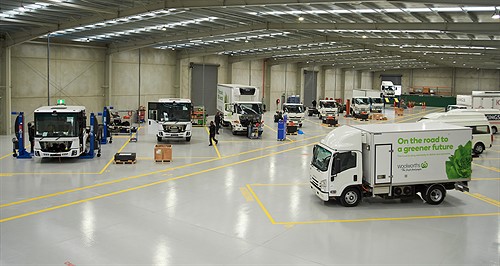
- Published in Articles, Media Release, News, SEA-Drive, Technology, Uncategorized
Beyond Zero Podcast talks to Glen Walker – SEA Electric
Beyond Zero speaks to Glen Walker, Regional Director Oceania of SEA Electric, an Australian automotive technology company about being first to market with the deployment of a 100% electric tipper truck.
Glen talks about SEA Electric’s design and development of their 100% electric commercial trucks and vans, and how the assembly and deployment of these vehicles is growing globally.
Beyond Zero Podcast, 3CR 855am Community Radio, 20 September 2019
- Published in Articles, Media Release, News, SEA-Drive, Technology, Uncategorized
Salvos Stores first charity retailer to utilise electric vehicle, thanks to SEA Electric
Salvos Stores are the first charity retailer in Australia to have an electric vehicle in their distribution fleet thanks to the generous donation by SEA Electric. This electric vehicle emits zero carbon emissions and this will help reduce Salvos Stores emissions of CO2 by approximately 2 tonnes each year. (per SEA Electric)
As part of SEA Electric’s philanthropic activities, The SEA Foundation has generously donated an electric vehicle to Salvo’s Stores. The value of this donation is estimated at approximately $50,000.
“The SEA Foundation was created by the shareholders of SEA Electric. An Australian automotive technology company, that has commercialised 100% electric power-system technology for the urban delivery vehicle sector. In doing so, we are removing many diesel polluting vans and trucks from around the globe and replacing them with zero emission alternatives. Says Tony Fairweather, Group Managing Director, SEA Electric.
Here at SEA Electric we not only want to improve the impact on the environment, but also to improve the lives of those within our community. We’re excited to donate this 100% electric vehicle to the Salvation Army, which will assist them in their future charitable endeavours.” Said Mr. Fairweather.
The donation of this electric vehicle will help to further Salvo’s Stores commitment to being a more accessible pillar of the community, providing greater support to community by being able to facilitate some last minute collections.
“We would like to extend our deepest thanks to SEA Electric for the donation of this electric vehicle. The donation of this vehicle will allow us to be more versatile in the way we respond to last minute home collection requests and with the increase in donation volume in the wake of the Marie Kondo craze, it couldn’t have come at a better time.” Said Neil Lund, General Manager of Operations, Salvos Stores.
Salvos Stores is focusing on minimising impact on the planet by continuously striving for new ways to reduce impact. Introducing the first electric vehicle into its fleet of trucks is a step to a more sustainable future and a new way of operating a large logistics network.
“We really appreciate the generosity of SEA in providing us with this amazing electric vehicle. It’s a great opportunity for Salvos Stores to be the first charity retailer with an electric vehicle in it’s fleet and as we focus on finding ways to continue to reduce our environmental impact, this is a big step in the right direction. Our corporate partners are a vital part of what we are able to do as a charity retailer and this donation opens so many doors for us to be more responsive and agile to our community’s needs.” Said Matt Davis, National Director, Salvos Stores.
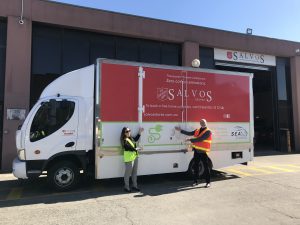
The Salvos Stores 100% electric home collections truck was launched on Wednesday 18th September 2019 at the Salvos warehouse in Noble Park. In picture Eva Zelos, Acting Managing Director – Salvos Stores, and Glen Walker, Regional Director Oceania – SEA Electric. READ MORE
Article By MENAFN, 9/11/2019
- Published in Articles, Media Release, News, SEA-Drive, Technology, Uncategorized
SEA ELECTRIC IN FLEET AND PRODUCTION MOVES
Two small rigids find homes as US van goes on the line
A big week for Australian alternative propulsion truckmaker SEA Electric is capped off with Melbourne’s City of Yarra showing off its light rigid rubbish and recycling tipper.
According to the council, it will be used five days a week for hard rubbish collections.
“Electric vehicles are the way of the future,” mayor Danae Bosler says.
“A handful of councils have electric waste trucks but our new electric tipper is an Australian first.
“Yarra Council’s assets and facilities are powered by 100 per cent renewable energy, meaning this will be a genuinely zero-emissions vehicle.
“We’re also exploring how we can transition to electric rubbish and recycling trucks over the next five years.
“This is just one is just one of the ways we’re acting in response to the climate emergency.
“For now at least, our electric tipper means one less noisy, polluting truck on our roads.
“As a council we are in a unique position to use our purchasing power to make sustainable choices, and we’re proud to be supporting the local electric vehicle industry.”
Earlier, the Salvation Army’s Salvo Stores were the recipient of its first electric pantech, valued at $50,000, courtesy of the manufacturers charity, SEA Foundation.
“The SEA Foundation was created by the shareholders of SEA Electric. An Australian automotive technology company, that has commercialised 100 per cent electric power-system technology for the urban delivery vehicle sector,” SEA Electric group MD Tony Fairweather says.
“In doing so, we are removing many diesel polluting vans and trucks from around the globe and replacing them with zero emission alternatives.
“Here at SEA Electric, we not only want to improve the impact on the environment, but also to improve the lives of those within our community.
“We’re excited to donate this 100 per cent electric vehicle to the Salvation Army, which will assist them in their future charitable endeavours.”
Read how East Waste goes forward with its electric compactor program, here
The pantech, the first electric vehicle in its fleet, will be put to use in Salvo Stores’ hefty pick-up and delivery logistics task.
“The donation of this vehicle will allow us to be more versatile in the way we respond to last minute home collection requests and with the increase in donation volume in the wake of the Marie Kondo craze, it couldn’t have come at a better time,” Salvos Stores GM of operations Neil Lund says.
The week kicked off for SEA Electric with a headline development in its US initiative, with the first Ford F-59 electric van in production at Ford’s Detroit Chassis Plant in Michigan.
The F-59 EV is being built on a Morgan Olson Walk-in Van body and will be deployed in the northern autumn for delivery routes in the greater Detroit area with a “leading package delivery company”, SEA says.
The van will be powered by a SEA Drive 120b power-system and boasts 150kW of continuous power and 250kW maximum power, and 2500Nm maximum torque, with a range put at up to 220 miles (350km).
Battery charge time is put at four to six hours using a 19.2kW single phase 240V on board charger.
“We anticipate a very successful trial which will lead to substantial follow-on orders from fleet customers within the next 6-12 months,” SEA Electric regional director – North America David Brosky says.
The bodybuilder notes there is demand in the US for such a vehicle.
“We see a growing interest, within our portfolio of walk-in step van customers to include electrified work trucks within their fleets,” Morgan Olson director of business development John Knudtson is quoted as saying.
“We’re pleased to be working with SEA Electric on this new Ford F59 electric chassis.
“In the past, we’ve built numerous step van bodies on various alternative powertrains and are pleased with how our body has adapted to the new Sea Electric platform. ” READ MORE
Article by ATN, fullyloaded.com.au 13.09.2019
- Published in Articles, Media Release, News, SEA-Drive, Technology, Uncategorized
SEA Electric Exhibiting at National Roads & Traffic Expo
Australian automotive technology company SEA Electric is set to exhibit at the National Roads & Traffic Expo on September 17 and 18 2019, Stand 901.
SEA Electric will have on display the recently launched SEA NPR EV tipper truck, Australia’s first 100% electric tipper truck. Fully powered by electricity with integrated body and ancillaries, the tipper truck will be deployed at the City of Yarra immediately after the expo for hard rubbish collections.
The Isuzu NPR 65-190 tipper is powered by a SEA-Drive® 100 power-system which produces 59kW continuous power and 108kW maximum power. More importantly for a commercial vehicle the SEA-Drive® 100 produces continuous torque of 1,000Nm, has a range of up to 275km (unladen), has an onboard three-phase charger that can be charged to 80% within 5 hours.
The electric tipper truck also offers zero emissions, mid mounted batteries for vehicle balance and safety and added driver protection. The driving environment is enhanced by no diesel fumes and very little noise.
Glen Walker, SEA Electric’s Regional Director of Oceania will be presenting at the National Roads & Traffic Expo on “The case for Electric Trucks and Why They Differ from Electric Cars” at 4.30pm on Tuesday 17th September.
“SEA Electric is proud to reveal this electric tipper truck at the National Roads & Traffic Expo”, said Glen Walker. “This vehicle, produced in partnership with the City of Yarra, reduces operating costs, enhances driving environment and lowers total cost of ownership when compared with existing diesel technology.”
The National Roads & Traffic Expo is being held at the Melbourne Convention & Exhibition Centre and is the expo that brings the entire road transport and infrastructure ecosystem together under one roof. The expo features hundreds of free information sessions and demos on topics relating to changes in Australia’s road infrastructure and traffic industries, and developments in the fields of infrastructure, traffic management, smart mobility, parking and safety.
SEA Electric is an Australian automotive technology company that locally develops and assembles 100% electric-powered vans, commuter busses, and light/medium duty rigid truck models using its proprietary SEA-Drive® power-systems. The company is rapidly growing across the globe recently taking several commercial EV orders in Australia, New Zealand, USA and Thailand.
SEA Electric head office operates from a facility in Melbourne with plans underway for a large-scale assembly facility in the Latrobe Valley in regional Victoria.
For information about SEA Electric’s 100% electric commercial vehicle range please contact Jacque May, Marketing, SEA Electric.
Jacque May, Marketing – SEA Electric, 0423 744 496, jacque@sea-electric.com, www.sea-electric.com
- Published in Articles, Media Release, News, SEA-Drive, Technology, Uncategorized
First 100% Electric Ford F-59 in Production for SEA Electric
SEA Electric has marked a turning point in its company history with the first Ford F-59 100% electric van in production at Ford’s Detroit Chassis Plant, Detroit, Michigan.
SEA Electric CEO, Tony Fairweather said “this is an exciting step forward for SEA Electric’s global footprint and a positive result for our USA operations who are currently working towards fulfilling several orders in the pipeline”.
The F-59 EV is being built on a Morgan Olson Walk-in Van body and will be deployed in Fall, 2019 for delivery routes in the greater Detroit area with a leading package delivery company.
The van will be powered by a SEA Drive® 120b power-system and boasts 150kW of continuous power and 250kW maximum power, and 2500 Nm maximum torque. With a range of up to 220 miles (350km), zero emissions, fewer moving parts and lower running costs, the 100% electric van is perfect for short stop-start delivery runs.
Charge time for the batteries is four to six hours using a 19.2kW single phase 240V on board charger.
David Brosky, SEA Electric’s Regional Director – North America said “We’re confident the fleet customer will love the overall performance of this SEA-Drive® powered delivery van. We anticipate a very successful trial which will lead to substantial follow-on orders from fleet customers within the next 6- 12 months.”
John Knudtson, Morgan Olson’s Director of Business Development, shared, “We see a growing interest, within our portfolio of walk-in step van customers, to include electrified work trucks within their fleets. We’re pleased to be working with Sea Electric on this new Ford F59 electric chassis. In the past, we’ve built numerous step van bodies on various alternative powertrains and are pleased with how our body has adapted to the new Sea Electric platform. “
SEA Electric is an Australian automotive technology company that locally develops and assembles 100% electric-powered vans, commuter busses, and light/medium duty rigid truck models using its proprietary SEA-Drive® power-systems. Additionally, the company also works closely with a selection of leading American truck companies and brands including Ford, Isuzu, and Chevrolet to engineer and locally assemble SEA Electric power-systems to their models.
SEA Electric head office operates from a facility in Melbourne with plans underway for a large-scale assembly facility in the Latrobe Valley in regional Victoria.
For information about SEA Electric’s 100% electric commercial vehicle range please contact David Brosky, Regional Director, SEA Electric.
David J. Brosky
Regional Director- North America
SEA Electric, LLC
(586) 945-2061
www.sea-electric.com
Morgan Olson is North America’s leading manufacturer of Walk-in step vans. Hailed as “The Home of the Walk-In Step Van,” Morgan Olson produces over 10,000 step vans annually from multiple manufacturing locations throughout the United States. Morgan Olson’s portfolio of customers serves a multitude of industries and delivery work truck applications. The primary industries served include the parcel package delivery, baking and snack foods, laundry& textile rental, service & utility vehicles, and food truck entrepreneurs.
Morgan Olson is a subsidiary of J.B. Poindexter & Co., Inc. For more information about Morgan Olson, visit www.morganolson.com or email info@morganolson.com.
- Published in Articles, Media Release, News, SEA-Drive, Technology, Uncategorized
City of Belmont and SUEZ welcome first Electric Vehicle recycling truck to the neighbourhood
SUEZ Western Australia’s first Electric Vehicle (EV) recycling truck has today hit the streets of the City of Belmont, showcasing the future of waste collection in the local community.
SUEZ State General Manager WA Craig Barker said the truck – capable of up to 1200 bin lifts per day – will deliver great outcomes for residents and businesses of the City of Belmont.
“The EV truck is another great example of how SUEZ strives to deliver the best solutions for our customers,” Mr Barker said.
First of its kind for SUEZ in Western Australia, the EV truck will save approximately 35,000 litres of diesel per year, avoiding around 90 tonnes of carbon emissions annually.
Features of the EV truck include an Iveco cab chassis fitted with an electric powered drive train fitted by SEA Electric in a SuperiorPak body. The 230kWh battery provides more than 200 kilometre driving range before recharge, which only requires a simple 32-amp, three-phase outlet.
“In addition to the EV truck’s performance, it’s also whisper quiet which will be welcomed by the City of Belmont community,” Mr Barker added.
City of Belmont Chief Executive Officer John Christie said the City was excited to be the first in Western Australia to benefit from SUEZ’s new EV truck.
“Reducing carbon emissions is a key element of our City’s Environment and Sustainability Strategy, and innovation in waste management is an important part of this,” Mr Christie said.
“We are delighted that SUEZ’s new zero emissions truck will lead our recycling collections and look forward to seeing it out servicing the community while minimising our environmental impact.
”The new EV truck will be collecting recycling from around the City of Belmont.”
In addition to generating zero emissions, the EV truck offers a huge range of benefits including no diesel or AdBlue fuel costs, minimal oil changes and significantly reduced maintenance.
“Improved braking also means brake pads only need to be replaced every two years, compared to quarterly changes in traditional diesel-powered side-lift trucks,” Mr Barker said. READ MORE
- Published in Articles, Media Release, News, SEA-Drive, Technology, Uncategorized
LINFOX trial electric truck developed by systems integrator SEA Electric for Woolworths Online and store deliveries.
As global interest in electric vehicles (EV) continues to grow, Linfox and its industry partners are working to accelerate uptake of the technology in Australia’s road transport sector.
Together with the Australian Logistics Council (ALC) and valued customers Woolworths and Australia Post, Linfox has helped form a working group dedicated to increasing industry engagement in EV technologies.
The ALC’s Electric Vehicles Working Group is focussed on setting industry priorities, identifying and navigating the barriers to uptake and supporting legislative and regulatory change.
As leaders in logistics, Linfox and the ALC appeared at the July Senate Inquiry into electric vehicles on behalf of the industry and provided recommendations and insights on the benefits of widespread adoption.
Earlier this year, Linfox Executive Chairman Peter Fox highlighted plans to make Linfox the first mover on electric vehicles, specifically electric trucks, subject to the development of supporting infrastructure and manufacturer supply of appropriate vehicles.
The plans are underpinned by Linfox’s 2007 commitment to reduce its environmental impact and advance technologies that deliver great outcomes for both customers and the planet.
To this end, Linfox is supporting customer and fellow ALC member Woolworths as it trials EV technologies at the Linfox owned Australian Automotive Research Centre in Anglesea.
The trial includes a fully electric truck developed by systems integrator SEA Electric for Woolworths Online and store deliveries. According to SEA Electric, the truck can travel more than 220 kilometres on one charge.
Linfox continues to work alongside the Electric Vehicle Council to engage key global suppliers to ensure the development of cost-effective, non-payload constrained EVs across several weight classes for use in the Australian market.
Linfox is paving the way for the introduction of EVs in its fleet by:
- trialling EVs at Linfox’s purpose-built facilities
- investing in renewable energy solutions to power EVs, including installing 500kW of solar panels in Linfox warehouses
- implementing EV material handling equipment at Linfox sites, and
- building EV requirements into new sites.
- Published in Articles, Media Release

